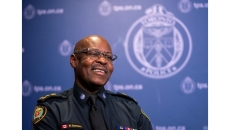A lawyer for a man who fatally stabbed a high school student four years ago in Abbotsford, B.C., says he will argue in court that the man is not criminally responsible because of a mental disorder.
The announcement comes just a week before Gabriel Klein was to be sentenced for the second-degree murder of 13-year-old Letisha Reimer and aggravated assault of her friend.
Defence lawyer Martin Peters says his client has changed his mind and wants to exercise his right to raise the issue of a possible mental disorder after he was found guilty in March.
Peters says he was concerned about completing the case before addressing the issue of whether there should be an exception to criminal liability because of his client's mental illness.
He says Crown lawyers told a B.C. Supreme Court judge they were blindsided by the news during a recent meeting and the sentencing hearing set for Sept. 23 has been cancelled.
Instead, Peters says they will meet Sept. 24 to fix a date to argue the claim of not criminally responsible.
Peters says a defendant has the right to raise issues of mental illness either during the trial or after a verdict.
"It's very similar to entrapment. You can raise mental disorder or entrapment as part of the trial ... or you can wait and see if the Crown can actually prove their case, which (it) did, and then raise it post-verdict."
During the trial, Peters had argued that Klein did not mean to kill Reimer and urged Associate Chief Justice Heather Holmes to find him guilty of manslaughter. Peters argued there was reasonable doubt related to the murder charge because his client exhibited odd behaviour and mental distress beforehand, suggesting he did not intentionally plan to kill anyone.
Crown attorney Rob Macgowan said in his closing argument that Klein faked symptoms of a mental disorder after his arrest in order to be found not criminally responsible of the crimes and even told a psychiatrist who assessed him at a hospital that his lawyer would use that as a defence.
Holmes said there was no evidence that the strange behaviour and sounds exhibited by Klein in the hours before the attack indicated a mental condition, but that doesn't mean they were "deliberately feigned."





.jpg)
